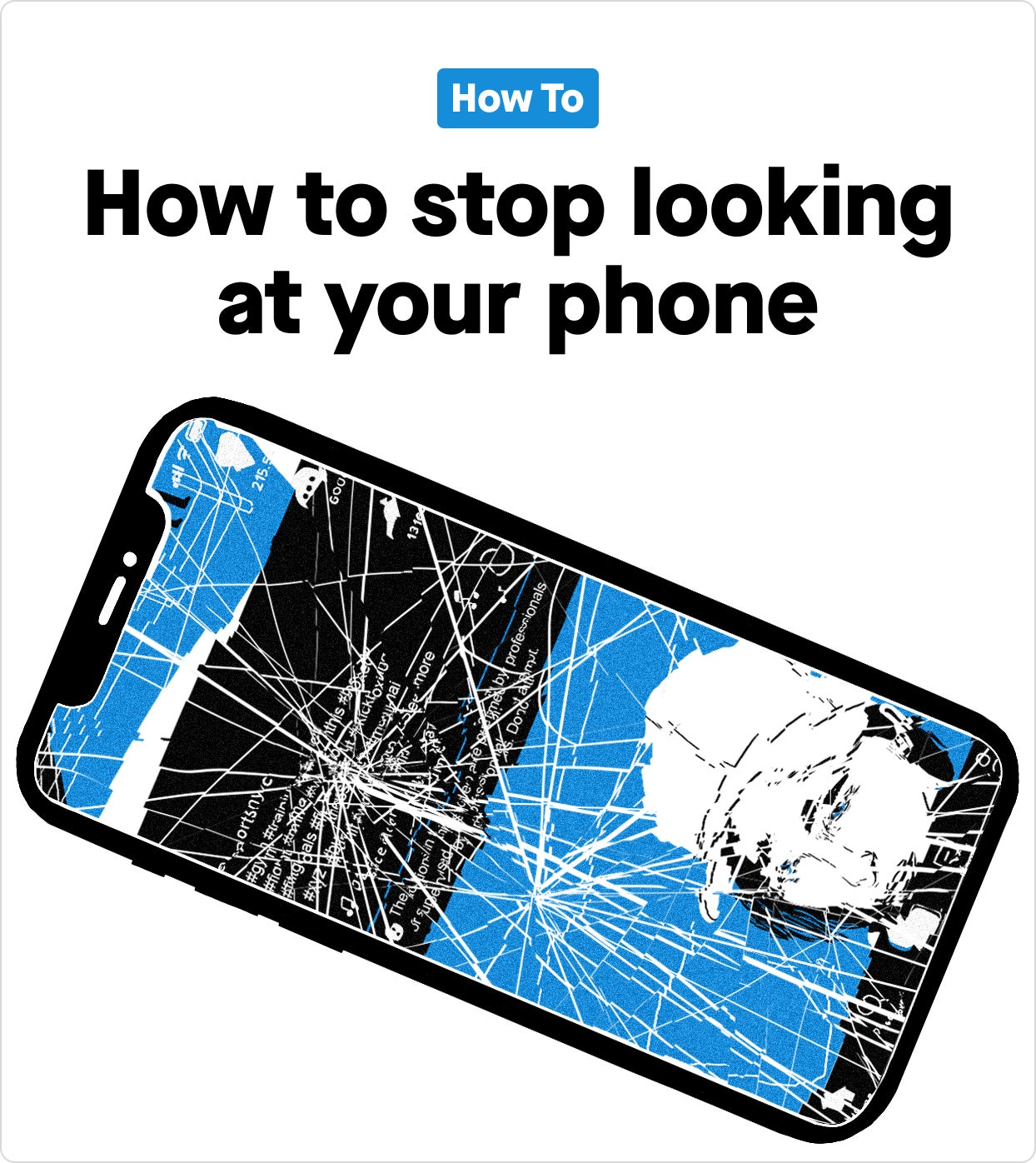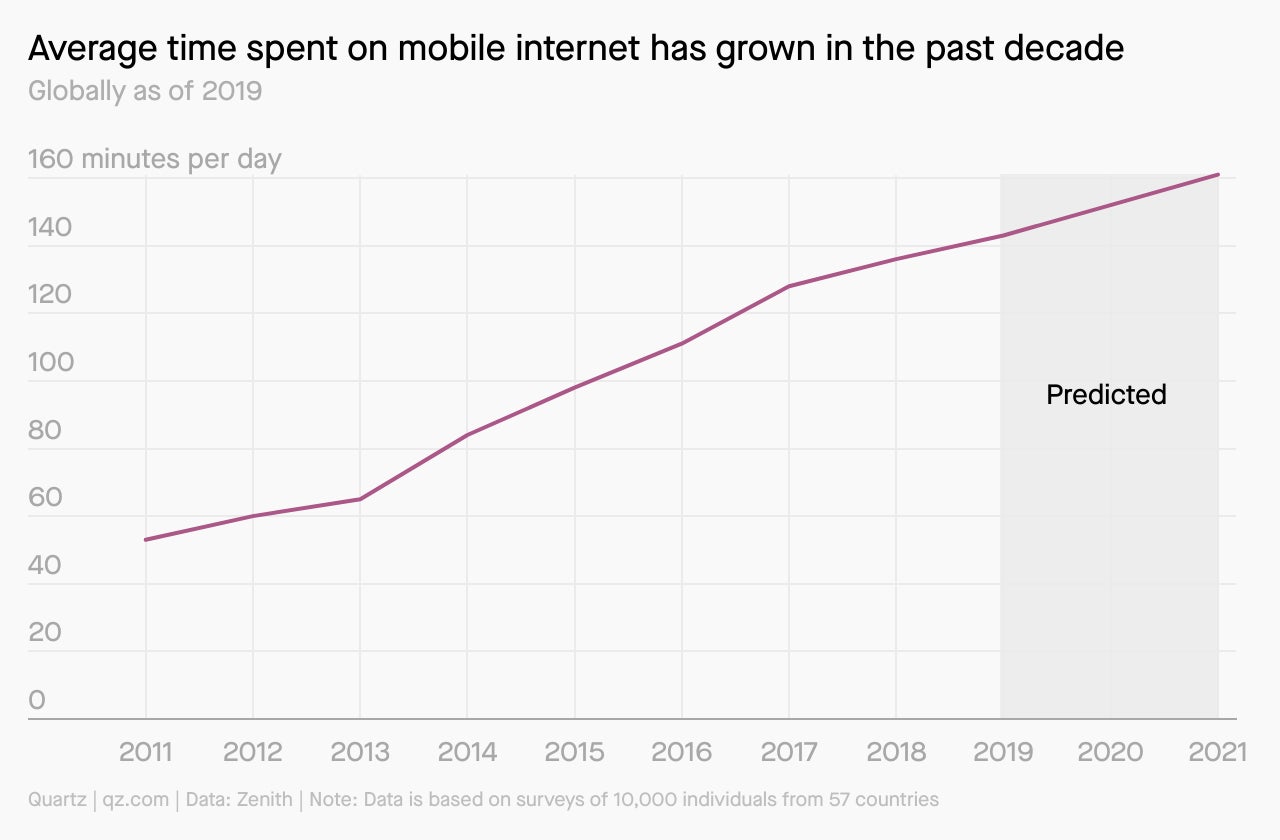How to stop looking at your phone
A few years ago, I, like many other people, came to the realization that I was spending more time looking at my phone than on other activities I enjoyed. I tried a few different methods to short circuit the tactics my phone was using to dominate my attention, from guilting myself with screen time tools to putting my phone in black and white to make it boring to look at.



A few years ago, I, like many other people, came to the realization that I was spending more time looking at my phone than on other activities I enjoyed. I tried a few different methods to short circuit the tactics my phone was using to dominate my attention, from guilting myself with screen time tools to putting my phone in black and white to make it boring to look at.
During the pandemic, of course, that all went out the window. I downloaded TikTok, and I resigned myself to a future largely spent in front of my phone.
But it’s not a hopeless fight, and as pandemic restrictions ease I’m again working to spend less time on my phone and more time on all the other things I care about. Here’s everything you need to know to spend less time on your phone and win the battle for your brain.
>50%: US 11-year-olds who owned a smartphone in 2019
54%: Teens who said they spent too much time on their phones in a 2018 Pew survey
4: Belgian Politicians caught distracted by their phones during a 24-hour parliamentary session, according to an analysis by an AI bot
Charting smartphone use over time
The daily average time people spend on their phones has been rising steadily for the past decade, according to data from measurement company Zenith.

How we got here
It’s not just because you’re bored—you keep looking at your phone because it’s designed to attract your attention.
Psychologists have found that many apps cause our brain to release dopamine, the feel-good chemical released when we socialize. That makes us more likely to pick up our phones again in the future, to get that quick dopamine hit, creating a feedback loop of good feelings—playing a slot machine does the same thing. “Because so many people use their phones as tools of social interaction, they become accustomed to constantly checking them for that hit of dopamine that’s released when they connect with others on social media or some other app,” reads an article in Healthline.
But there’s a fine line between enjoying something and feeling compelled by it. In fact, there’s a growing consensus among experts that the way we feel about our phones has pushed beyond a strong habit and into the territory of an addiction.
What the research says
In June, a team of economists from Harvard, Stanford, and New York universities released a white paper titled “Digital Addiction.”
The researchers recruited about 2,000 American adults who installed an Android app allowing them to limit screen time. Participants were given self-control options that were difficult to override, as well financial incentives ($2.50 for every hour they blocked Facebook, Instagram, Snapchat, Twitter, and YouTube). Users reduced screen time for those services by 22 minutes per day over 12 weeks.
The researchers built a model showing how well people’s behavior corresponded to their stated preferences (versus their compulsion to check their phones). “The model predicts that 31% of social media use is not what people would choose for themselves in advance,” they concluded. “These results suggest that better aligning digital technologies with well-being should be an important goal of users, parents, technology workers, investors, and regulators.”
Their paper added to a growing body of work on the effects of screen time. One 2017 study found that people who spent more than six hours per day in front of the TV or computer were more likely to be depressed. That’s especially true for adolescents; those who say they are more tethered to their phones are more likely to feel lonely and report lower overall psychological well being. In adults too much screen time may even have negative effects on sleep and eye health. These studies are reporting correlations, not proof that screen time causes depression. But experimental data has shown at least some forms of screen time make you less happy.
In 2018, some of the same economists ran an experiment (pdf) in which some participants were forced to spend four weeks away from Facebook. Afterward, those who’d been off Facebook were happier and less likely to log back on in the next four weeks. That suggests that the hardest part of cutting back on phone time is getting started.
Tips for cutting down your phone use
🧰 Use an app to track your screen time. Both Apple and Android devices have a screen time app built in. To get the most out of these apps, use them to set a limit for how much time you’d like to spend on your phone this week and then adjust your goal from there. Some apps and even wearables also have features that can turn off your access to certain sites for a designated period. A good rule of thumb: set a maximum time per day for any app with infinite scroll (*cough* social media *cough*).
🔕 Turn off notifications. “Whether you’re at work, home, or anywhere else, periodic pings about the recent past can be the enemy of staying in the present,” wrote my colleague Simone Stolzoff in 2018. This is especially true for things that often aren’t urgent, like email. If you’re feeling especially bold, try turning all notifications altogether and then adding back only those that feel most necessary, like, say, text messages and Slack. It’s a great way to help you feel in control of your phone, and not vice versa.
🤳 Put your phone physically out of reach. Waking up and immediately checking your texts is a bad habit that I am absolutely guilty of. But your phone can also distract you even when you’re not looking at it, according to Vox. Charge it outside the bedroom when you’re sleeping (even if that means buying an alarm clock), and keep it elsewhere when you’re watching TV for a more immersive experience.
✍️ Write down a list of moments when you’re most likely to use your phone. Then ask: Is there something you’d rather be doing instead, such as reading a book or connecting with loved ones? Make small, intentional changes to your habits, starting by replacing your phone with something else in just one such type of moment from your list.
🚫 Try a tech fast. If slowly spending more time away from your phone is feeling good, try spending some more intentional time without it. Try short stints by leaving your phone at home when going out to dinner, or don’t buy the wi-fi on your next flight. If you’re ready for the next level, commit to 24 hours without your phone, or take a trip where cell service is hard to find.
Five things to do instead of looking at your phone
🔭 Go outside. Take up birdwatching, go for a hike, or just take a stroll in the nearest park. The key is to not overthink it and just get outside and stay present.
🧩 Do a puzzle. This was a popular activity during the pandemic, but it’ll stay popular after, too. There are some very cool puzzles to buy, including those that are 3D or made of real wood.
📚 Read a book. A few recent recommendations from our highly literary newsroom include Detransition, Baby by Torrey Peters; Bunny by Mona Awad; Empire of Pain by Patrick Radden Keefe; and The Poppy War by RF Kuang.
🏊 Take a swim. It’s a low-impact activity that pushes you to be alone with your thoughts and love your body.
🥧 Bake something. Yes, paper cookbooks are still a thing.
Keep learning
The psychology of phones:
- Tech companies tried to help us spend less time on our phones. It didn’t work (Recode). Remember when Instagram hid likes? It didn’t change much about how people interacted with the app.
- Irresistible: The Rise of Addictive Technology and the Business of Keeping Us Hooked by Adam Alter (here’s a Q&A with him on the subject as a bit of a preview). Understanding how our phones play into our psychology is a great step to limiting their power.
Resources for cutting down on screen time:
- How to Break Up With Your Phone by Catherine Price. Need a clear, 30-day plan to break your phone’s spell over your mind? This book’s got it.
- Digital Minimalism: Choosing a Focused Life in a Noisy World by Cal Newport. One review calls this author “the Marie Kondo of technology.” Hard to argue with that.
Kids and screen time:
- How kids and parents navigate screen time and device distractions (Pew). Results of a survey show how often kids are concerned about their own screen time.
- How to manage your kids’ screen time during coronavirus (Quartz). A useful guide for the young ones even once the pandemic has subsided.
- I was a screen time expert. Then the coronavirus happened (New York Times). Anya Kamenetz wrote a book about how parents and their kids can agree upon a reasonable amount of time in front of phones. The pandemic was humbling.
- The best apps to manage your kid’s phone (Wirecutter). Their recommendations for teens are especially helpful.
Have a great weekend,
—Alex Ossola, membership editor (trying to cut back on TikTok use)
This email also brought you by Walter Frick, Scott Nover, and Michael Coren.
One 📱 thing

In 2015, US photographer Eric Pickersgill created “Removed,” a series of photos to remind us that the hunched pose of the phone-absorbed truly is strange.